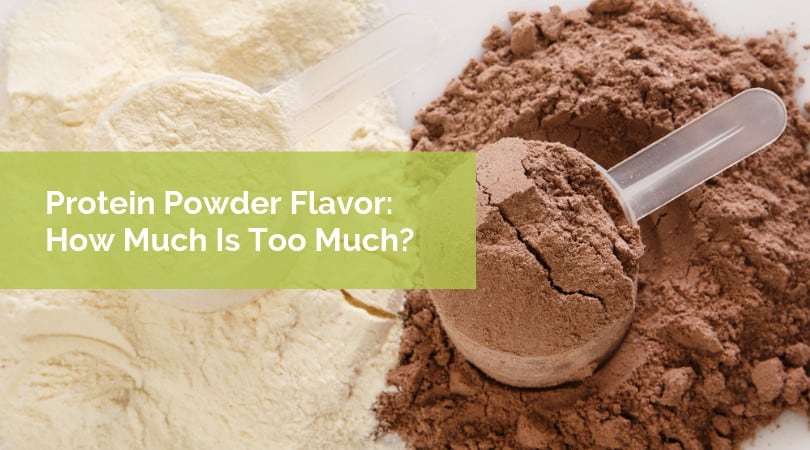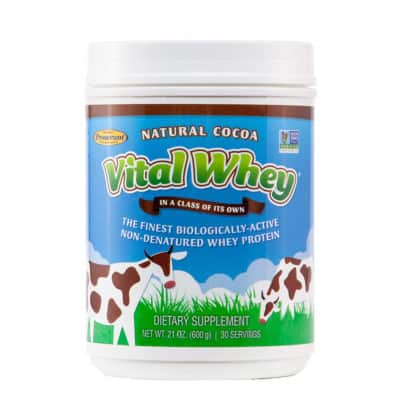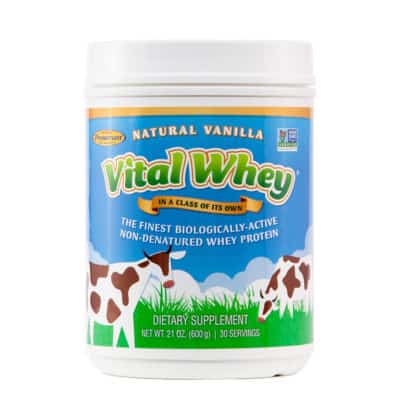
We all want our food (and drinks) to taste good. Protein powder is no exception. If a protein powder has an awful taste, are you really going to keep drinking it day after day? Probably not. The thing is that in order to create an appealing taste many protein powders with flavors have some less than desirable ingredients. So, what should you look for in a protein powder and what ingredients do you need to avoid?
Sugar
Sugar is one of the easiest ways to make a protein powder taste good. Most people love the sweet, addictive flavor of sugar. But, sugar does not provide any significant nutritional value and may put you at risk for weight gain and chronic disease. Sugar has been linked to an increased risk of diabetes, heart disease and certain types of cancer.
In beverages, sugar seems to be even more detrimental. A 2013 study found that for every sugar-sweetened beverage consumed caused a 0.5 pound of weight gain per year.4 Although that may not seem like a huge amount, many people don’t just drink one of these beverages a day and the pounds can add up over time.
Sugar is sometimes hidden in ingredient lists. Here are a few words to look out for that mean there is added sugar:
- High fructose corn syrup
- Corn syrup solids
- Maltodextrin
- Molasses
- Dextrose
- Fructose
- Glucose
- Brown, cane, or palm sugar
Additionally, always look at the nutrition facts panel. Although the current nutrition facts panel does not differentiate added from naturally occurring sugar to what has been artificially added, look for a product with less than 5 grams of sugar per serving.
Artificial Sweeteners
If you can’t have sugar, why not just add an artificial sweetener that tastes like sugar, but has no calories, right? These additives can also have significant negative consequences for our metabolism.
A 2014 study found that regular use of artificial sweeteners significantly altered the metabolism of bacteria in the gut, leading to glucose intolerance. If the intolerance becomes severe, this can lead to type 2 diabetes.
Artificial sweeteners that you want to avoid in your protein powder include:
- Aspartame
- Sucralose
- Saccharin
- Ace-K
Instead look for protein powders flavored with natural sweeteners. A few to try include stevia, monk fruit, erythritol or xylitol. The last two are sugar alcohols which can cause some digestive discomfort if consumed in large quantities, so you want to proceed with caution.
Texturizers and Gums
Making a pure high quality protein powder can be quite expensive. Therefore, many companies cut corners by adding fillers to increase the volume of the product. Although many of these fillers are not necessarily harmful, you want to pay for protein, not filler. A few ingredients to look for include:
- Xanthan gum
- Inulin
- Cellulose
One thickener that may not be completely inert like the others is carrageenan. This is a thickener made from a certain type of seaweed. It has been linked to increased inflammation and digestive problems. It is also a possible carcinogen, therefore it is probably best to avoid it in your protein powder.
Processed Vegetable Oils
Vegetable oils, like soybean, canola or sunflower oil, are added to protein powders for thickening, flavor-enhancing or defoaming. These types of oils are usually highly processed and extracted using chemical solvents. Increased consumption of these type of vegetable oils has been linked to inflammation.
Additionally, it is commonly recognized that our diets are too high in omega-6 fats, the type of fat in most vegetable oils, and too low in anti-inflammatory omega-3 fats. The imbalance in the type of fat in our diets has been linked to an increased risk of multiple chronic diseases from heart disease to mental illness.8 When choosing protein powders with flavor, remember to avoid any that have these type of vegetable oils added.
Choosing Protein Powders with Flavors
Now that you know what ingredients to avoid, how do you choose the right protein powder? For the greatest versatility, consider an unflavored protein powder to start with. This eliminates the potential for less than ideal ingredients.
Additionally, an unflavored protein powder allows you to mix the protein powder with food, both savory and sweet. It will give you the most flexibility for your dollar, without making a commitment to a specific flavor you might not love.
You can always add your own flavorings to the unflavored powder. This will allow you to control the type of sweetener you add. For example, you can choose “natural” sweeteners like stevia or use fresh fruit.
In terms of flavorings the possibilities are endless. Add natural vanilla extract or raw cacao for a vanilla or chocolate shake. Cinnamon, chai spice, powdered fruits, orange zest, coffee, peanut butter powder or almond essence can all be added to create a variety of flavor combinations based on your personal taste preferences.
If you prefer to not get too creative with flavorings, a high quality vanilla or chocolate protein powder with a natural sweetener can also be quite versatile to add to smoothies or shakes. These two simple protein powders with flavors lend themselves easily to the addition of other ingredients as well.
If you would like more information about Well Wisdom’s own Vital Whey Cocoa and Vital Whey Vanilla, CLICK HERE
The bottom line when choosing a protein powder is to look for minimally processed, high quality products with few added ingredients. This ensures that you are getting the most value and nutrition out of your protein powder, without any undesirable additives.
Recommended Products
References
- Basu S, Yoffe P, Hills N,DiNicolantonio JJ, Lucan SC, O’Keefe JH. The Evidence for Saturated Fat and for Sugar Related to Coronary Heart Disease. Prog Cardiovasc Dis. 2016;58(5):464-472.
- Lustig RH. The relationship of sugar to population-level diabetes prevalence: an econometric analysis of repeated cross-sectional data. PLoS One. 2013;8(2):e57873.
- Tasevska N, Jiao L, Cross AJ, et al. Sugars in diet and risk of cancer in the NIH-AARP Diet and Health Study. Int J Cancer. 2012;130(1):159-169.
- Malik VS, Pan A, Willett WC, Hu FB. Sugar-sweetened beverages and weight gain in children and adults: a systematic review and meta-analysis. Am J Clin Nutr. 2013;98(4):1084-1102.
- Suez J, Korem T, Zeevi D, et al. Artificial Sweeteners Induce Glucose Intolerance by Altering the Gut Microbiota. Obstetrical & Gynecological Survey. 2015;70(1):31-32.
- Carrageenan: New Studies Reinforce Link to Inflammation, Cancer, and Diabetes. Cornucopia Institute. April 2016.
- Hibbeln JR, Nieminen LRG, Blasbalg TL, Riggs JA, Lands WEM. Healthy intakes of n−3 and n–6 fatty acids: estimations considering worldwide diversity. The American Journal of Clinical Nutrition. 2006;83(6):1483S – 1493S.
- Patterson E, Wall R, Fitzgerald GF, Ross RP, Stanton C. Health implications of high dietary omega-6 polyunsaturated Fatty acids. J Nutr Metab. 2012;2012:539426.
- Best Fitness Supplements: Glutamine and Colostrum Uses and Benefits - December 19, 2019
- Cooking with Protein Powder - November 22, 2019
- Is There A Point To Taking Whey Protein After Cardio? - September 16, 2019







